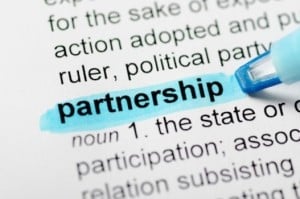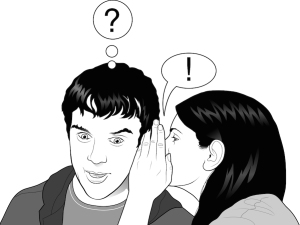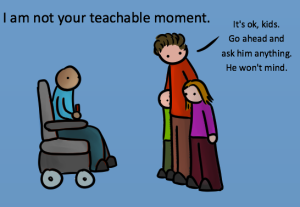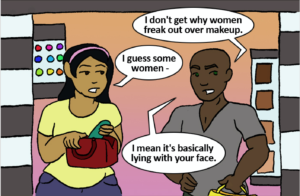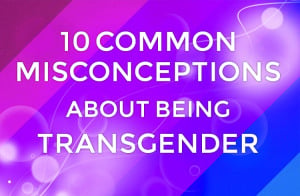
A person with a serious expression and a scarf around their neck stands against a wooden backdrop.
When you come across the word ethnic, what do you think about?
Let me guess. Brown people. Or if your head first goes to the foodie scene, then you’re probably thinking about the food of brown people.
And that’s because ethnic is a label commonly used to describe people of color and their cultures. When we’re talking about people who are of Asian, Latinx, or Middle Eastern descent, we call them “ethnic.” And when we’re looking for something other than typical American food for dinner, we say we want “something ethnic.”
So what about white people? Why aren’t they considered ethnic?
Here’s the thing: An ethnic group is a category of people who identify with each other based on things like a common language, religion, ancestral location, and history.
So if you think about it, all people, including white people, are ethnic. Because all people identify in some way with a location, language, religion, and/or history.
Ethnicity is also often used interchangeably with words like race and nationality. And while those may inform someone’s ethnicity, they’re not strictly the same thing. Race is a social construct that groups people by their physical characteristics, such as skin color. Nationality is your status of belonging to a particular nation, whether that’s by birth or naturalization.
For example, because I self-identify as a Filipino American, I would consider my ethnicity to be Filipino, my nationality to be American, and my race to be Asian.
When a white person self-identifies as white, they’re describing themselves by their race alone. Their ethnicity could be English or German, and their nationality could be American.
So then, what makes white people special enough to not be considered ethnic like everybody else? You guessed it. The thing that always makes white people special: white supremacy.
So does that mean that using ethnic to only describe people of color is racist? Yup. Because the way it’s used implies that whiteness is the superior standard; therefore, white people don’t need to be differentiated by their ethnicity like people of color do.
Some people might think this is being overly sensitive. Why does everything have to be racist all the time?
Because racism, unfortunately, is everywhere. It’s in the neighborhoods we live in, the schools we get into, the movies we watch, and the water we drink (I’m talkin’ about you, Flint). It’s also in the language we use, which plays an enormous role in shaping the way we see the world and the people around us.
We use the words that we’re used to, the way that everybody else uses it. So if you’ve been using the word ethnic to describe people of color, that doesn’t necessarily make you a hateful person. It’s what we’re taught; it’s convention. But again, the language we use does reflect and uphold racist systems of oppression, so we should be mindful about what words we choose to say.
As a Filipino American, I would be considered somebody who is “ethnic.” Because of this, I’m constantly reminded that I’m “the other.” And that means that, as long as the terms is used in this way, I can’t be seen as “normal” or “average.”
And that sucks. Not just for me, but all people of color who have to experience the same marginalization, day in and day out.
So let’s unpack this further. Here are four reasons why we need to stop using the word ethnic to refer specifically to people of color.
1. It Upholds the Idea That White People Don’t Have Ethnicity
While having conversations about ethnicity or cultural backgrounds, I’ve heard many white friends awkwardly excuse themselves by saying: “I’m not anything, I’m just white!”
Which, as we discussed, isn’t true. Their families came from somewhere. They didn’t just spontaneously poof into existence.
White people have ethnicities. They could be Irish or Scottish or Greek or French or Swedish or Dutch, among others.
They just have the white privilege of being part of the dominant group. And therefore, unlike people of color, they don’t have their ethnicity rubbed in their faces all the time. That’s the thing about privilege – those that have it don’t always notice it because they don’t have to.
Again, this idea that whiteness is the absence of ethnicity and sets white people as the norm and places them above all other people of color.
2. It Lumps All Sorts of Cultural Groups into Big, Vague Blobs
It creates a fictional dichotomy between white people and everybody else. And this erases the vast amounts of diversity and nuance within both categories.
The way people tend to use the word ethnic is to describe a shit ton of different types of people from all over the Earth, who have a world’s worth of different experiences and intersecting identities along with them. People who are Cambodian are different from people who are Dominican, and different from people who are Arab.
You could argue that the phrase “people of color,” which I have used so liberally throughout this article, does this, too. However, the difference is that “people of color” is used as term of empowerment that expresses a social relationship among ethnic and racial minority groups in solidarity. It also acknowledges how the experiences of these groups are categorically different from white dominant groups due to systems of oppression.
So “people of color” is often used to point out social injustices that apply to all non-white folks, while “ethnic people” is often used to “otherize” them.
When you simply otherize minority groups without recognizing how they’re affected by systems of oppression, that’s when lumping them into one big, ethnic blob is harmful. Because then, by ignoring their diversity, you’re deeming their unique identities and experiences as unimportant and not valuing them as real people.
And you know what? The phrase white people can do the same thing. We know that there’s a lot of diversity within the category labeled “white” – as pointed out in the last section.
And that also includes histories of marginalization. People with Italian, Irish, and Jewish heritage, for example, have only recently become bunched into this idea of superior whiteness after a long history of being targeted as ethnic minorities themselves.
Because of this, some white folks who are disconnected from their cultural heritage may feel like they’re missing an essential understanding about their identity and family history.
And for white folks who do retain a strong sense of ethnic identity, some become annoyed or even offended when they’re blended into this “just plain white” category that erases their ethnic background against their will.
3. It Exotifies People of Color
Ethnic is used almost interchangeably with exotic – which is an equally problematic term: Exotic compared to what, exactly?
When I was a freshman in college, one of my white friends said she was jealous of my beautiful brown skin because it was “so exotic.” At the time, I took it as a compliment: “Hey, these white people think I’m special for some reason, even though I was born and raised here in Virginia!”
But what I didn’t realize was that while being called “exotic” sounded enticing and mysterious, stripped down, it only really meant one thing: foreign. Which, actually, I wasn’t.
When ethnic is used this way in the US, it positions people of color like Asian Americans and Latinx Americans as perpetual foreigners who will never be seen as truly belonging in this country – whether or not they were born here, whether or not their families have been for generations.
Calling people of color “exotic,” especially women, is also incredibly harmful. It positions them as objectified and sexuality beings and enables them to become targets of sexual violence.
Ultimately, it’s dehumanizing. After all, exotic is most commonly used to describe fruits or animals that seem strange and unusual.
And that’s what you’re telling people when you call them ethnic – that they are strange and unusual, and not like normal (read: white) humans.
4. It’s Used to Position Some Cultural Groups Inferior
When people say “Let’s go out and eat some ethnic food,” they’re not talking about that high-end French restaurant downtown or that adorable Italian bistro – even though French and Italian are, indeed, ethnicities.
Nope. They’re talking specifically about Indian food, Thai food, Ethiopian, Mexican.
Lavanya Ramanathan, a reporter for the Washington Post, says that the problem with calling immigrant food “ethnic” is that it’s applied selectively “to cuisines that seem the most foreign, often cooked by people with the brownest skin.”
This is especially problematic if you think about how “ethnic” cuisines are perceived to be lower than European or fusion cuisines. Diners often expect them to be dirt cheap – and will even become offended if they have to pay more than $30 for a full meal.
I used to think that way, too. The first time I went to what is now my absolute favorite Mexican restaurant, I looked at the menu prices and was slightly outraged: “Two-fifty for one taco?! That’s absurd!” (Little did I know, of course, that I was about to taste the best tacos I’ve ever had in my life).
But by expecting these foods to cost next to nothing, you’re not only devaluing the food itself, you’re also devaluing the people who cook the food, their culinary expertise, and their cultural heritage. You’re saying that they don’t deserve to be paid more for what they’ve created – just because they’re “ethnic.”
And this is tied into the way we perceive these people who we think of as being from “second or third world” countries. We think they’re poor, and so their food should be cheap.
***
I’m not suggesting that we ban the word ethnic. The problem isn’t the word itself. It’s a descriptor of ethnicity, which is a critical part of everyone’s identities that shouldn’t be ignored.
The problem is in the way it’s used to marginalize people of color.
The issue isn’t the word ethnic in and of itself because even if we stopped using it, it would just be replaced by something else – because the ideological beliefs around the word would still be intact. For instance, think about how “world food” is sometimes used interchangeably with “ethnic food,” even though all food is technically “from the world,” just like all food is technically ethnic.
As I already mentioned, “people of color,” is a great alternative to “ethnic people.”
You could also be more specific about the cultural groups you’re referring to. Since it doesn’t make sense to call a certain group of cuisines “ethnic food,” just call them what they are – Vietnamese food, Belgian food, Lebanese food.
Or if the situation doesn’t call for a need to differentiate a group of people by their ethnicity, then just don’t.
Lastly, you can encourage more people to understand the issues behind how people normally use the word ethnic. Explain to others that we are all ethnic and help break down the misconceptions around the word that uphold the idea of white superiority over people of color.
By changing this habit, you might not be immediately ending racism, but you would be taking one small step towards helping people of color be seen as they should be seen – not as “ethnics,” but as equal human beings.
[do_widget id=’text-101′]
Sherina Ong is Writing Fellow for Everyday Feminism and a Filipina American writer, journalist, and intersectional feminist who believes that stories speak louder than words. Sherina juggles freelance writing, radio producing and trying to get people to care about minorities throughNextDayBetter, a storytelling platform for Filipino and Asian Pacific Islander diaspora communities. You can follow her on Medium and Twitter @sherinaong.
Search our 3000+ articles!
Read our articles about:
Our online racial justice training
Used by hundreds of universities, non-profits, and businesses.
Click to learn more










